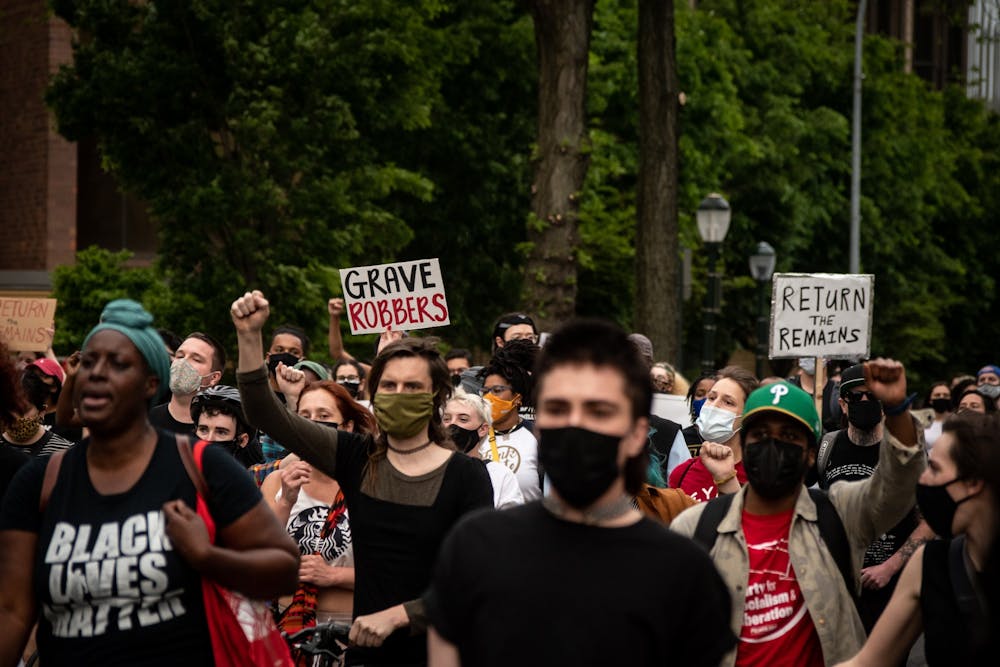
After a yearlong investigation on the handling of the remains of the 1985 MOVE Bombing victims, investigators remain unable to explain how a box of victims’ remains managed to lay undetected in cold storage in the Philadelphia Medical Examiner’s Office for decades after the bombing.
In 1985, the Philadelphia city government bombed the residence of the Black liberation advocacy group MOVE, killing five children and six adults, destroying 61 homes, and displacing 250 residents from the neighborhood. Penn faced criticism last year when it became known that MOVE bombing remains were in the Penn Museum’s possession.
In a separate controversy, a box of the victims’ remains was found in the medical examiner’s office last year in May, just days after former Philadelphia Health Commissioner Thomas Farley resigned over his order to cremate the remains without notifying the victims’ families.
“We are getting to the bottom of many different disturbing questions, including why these remains were held for decades, and why they were still held after being directed to be cremated,” Philadelphia Mayor Jim Kenney said in a statement in 2021.
To look into the mishandling of the MOVE bombing victims’ remains, city officials commissioned investigators from two law firms: Dechert LLP and Montgomery, McCracken, Walker, & Rhoads LLP, The Philadelphia Inquirer reported.
On June 6, these investigators released a 257-page report of their findings, concluding that the 1985 investigation was “grossly inadequate” and that the understaffed medical examiner’s office is still unable to effectively investigate homicides.
According to the report, the medical examiner’s office demonstrated negligent practices beginning at the very scene of the bombing.
The medical examiner at the time failed to send staff to the scene to ensure the proper recovery of the victims’ bodies. Consequently, the extraction process damaged victims’ bodies, jeopardizing future forensic investigations and dooming the chain of custody from the beginning.
The report states that the medical examiner’s office’s documents on the victims were “incomplete, inconsistent, and, at times, contradictory” from the start. Accordingly, investigators were unable to determine “what remains, if any, were released [to victims’ family] … and actually buried or cremated.”
In 2017, a staffer at the medical examiner’s office found a box labeled “MOVE Evidence” containing bones and bone fragments of unidentified victims. Investigators determined that the victims’ families should have been notified immediately after the bone fragments were found.
Instead, then-Medical Examiner Sam Gulino and Farley decided to cremate the remains following a waiting period of six months to ensure that the bones’ existence would not become widely known.
However, without Farley’s knowledge, an employee disregarded Farley’s order to cremate the remains. The box was found intact in 2021 — the reasons behind the employee’s decision remain unknown as they, among several other former employees, have refused to speak to the investigators.
Though they lacked some information from key witnesses, investigators hope that the information they found will serve as a foundation for any future analysis.
The report lays out 16 recommendations to the medical examiner’s office, which the Philadelphia Department of Public Health has accepted. One of these recommendations is to change the bombing victims’ death certificates to reflect that the cause of their deaths was homicide, not accidents.
The report also highlights the need to educate city residents on the deadly MOVE bombing, which remains relatively unknown to those outside Philadelphia and younger city residents. Finally, the report calls for improved practices at the medical examiner’s office, including more cultural diversity training.
Though the report does not explicitly blame racism for the mishandling of victims’ remains, it does state that “it is difficult to believe that all of the omissions and commissions discussed above were made simply through negligence.”
"Some of the changes recommended are already in process. Some will be challenging due to funding constraints," Philadelphia Health Commissioner Cheryl Bettigole said. "In addition to the changes recommended by the investigators, we are committed to working with the families of the victims to identify a respectful plan for how to handle the remains."
The Daily Pennsylvanian is an independent, student-run newspaper. Please consider making a donation to support the coverage that shapes the University. Your generosity ensures a future of strong journalism at Penn.
Donate







